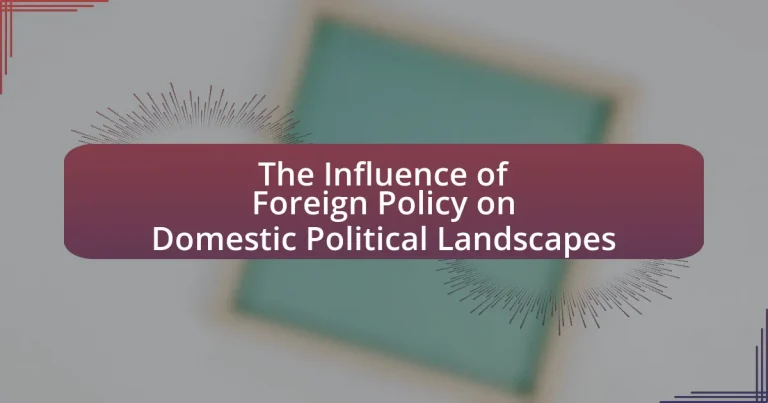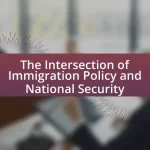The article examines the influence of foreign policy on domestic political landscapes, highlighting how international relations shape public opinion, party dynamics, and electoral outcomes. It discusses key factors linking foreign policy to domestic politics, such as public sentiment, political agendas, and economic interests. The article also explores how political parties respond to foreign policy changes, the role of public opinion in shaping policy decisions, and the mechanisms through which foreign policy impacts domestic governance. Additionally, it addresses the importance of citizen engagement in foreign policy issues and the varying responses of democratic and authoritarian regimes to foreign policy influences.
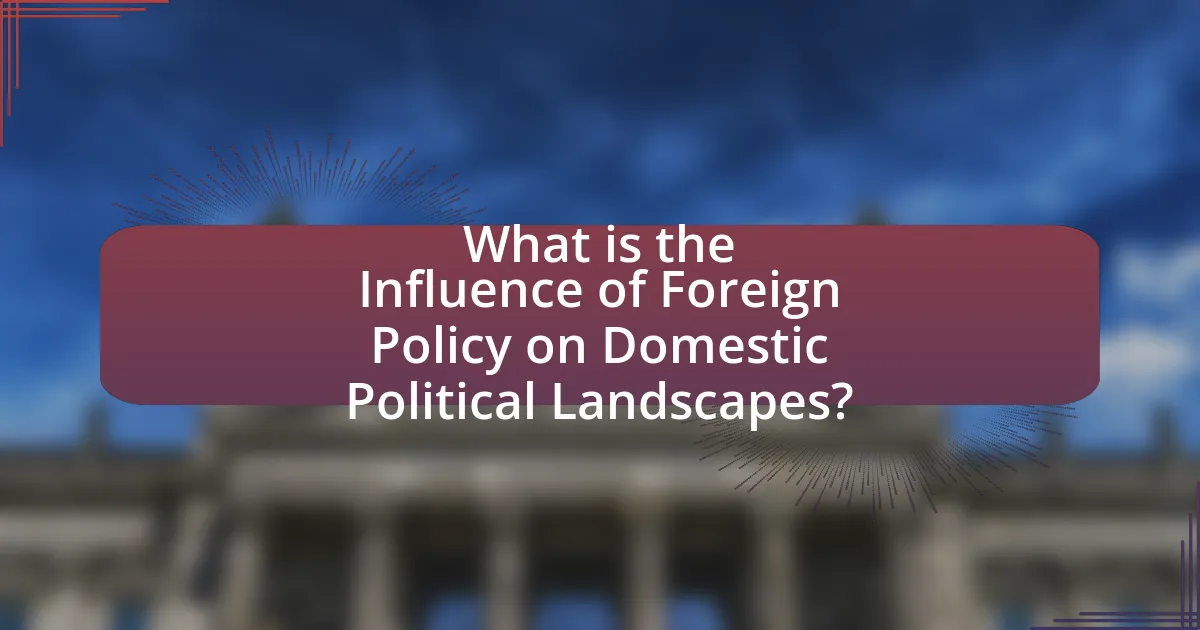
What is the Influence of Foreign Policy on Domestic Political Landscapes?
Foreign policy significantly influences domestic political landscapes by shaping public opinion, party dynamics, and electoral outcomes. For instance, a successful foreign policy can bolster a government’s approval ratings, as seen during the Gulf War in the early 1990s, when President George H.W. Bush experienced a surge in popularity due to military success abroad. Conversely, unpopular foreign interventions, such as the Vietnam War, can lead to domestic unrest and political upheaval, affecting the ruling party’s stability and electoral prospects. Additionally, foreign policy decisions can polarize political parties, as seen in the debates over the Iraq War, where differing views on intervention strategies led to significant divisions within and between parties. Thus, the interplay between foreign policy and domestic politics is evident in historical contexts and contemporary political dynamics.
How does foreign policy shape domestic political agendas?
Foreign policy shapes domestic political agendas by influencing national priorities and political discourse. For instance, when a government engages in military intervention abroad, it often shifts public attention and political debate towards issues of national security and defense spending. This can lead to increased support for political parties that advocate for strong military policies, as seen in the United States during the post-9/11 era, where foreign policy decisions significantly impacted the political landscape and electoral outcomes. Additionally, foreign policy can create divisions within political parties, as differing views on international relations may lead to factionalism, affecting legislative agendas and party unity.
What are the key factors that link foreign policy to domestic politics?
Key factors linking foreign policy to domestic politics include public opinion, political party agendas, economic interests, and national security concerns. Public opinion shapes foreign policy decisions as leaders often align their actions with the preferences of their constituents to maintain support. Political party agendas influence foreign policy through ideological frameworks that dictate how parties approach international relations. Economic interests drive foreign policy as governments seek to protect and promote national economic benefits, such as trade agreements or resource access. National security concerns also play a crucial role, as domestic political stability often hinges on the perception of threats and the effectiveness of foreign policy in addressing them. These factors collectively demonstrate the interconnectedness of foreign policy and domestic political landscapes.
How do political parties respond to changes in foreign policy?
Political parties respond to changes in foreign policy by adjusting their platforms, strategies, and messaging to align with public sentiment and national interests. For instance, when a government shifts its stance on international trade agreements, parties may either support or oppose the changes based on their ideological beliefs and the preferences of their constituents. Historical examples include the Democratic Party’s response to the North American Free Trade Agreement (NAFTA) in the 1990s, where opposition grew among party members due to concerns about job losses, leading to a reevaluation of trade policies in subsequent elections. Additionally, parties may leverage foreign policy changes to critique the ruling government, as seen during the Iraq War, when opposition parties capitalized on public dissent to gain electoral support.
Why is understanding this influence important for citizens?
Understanding the influence of foreign policy on domestic political landscapes is crucial for citizens because it directly affects their lives, governance, and national security. Citizens who comprehend this influence can better engage in political discourse, advocate for policies that align with their interests, and hold their leaders accountable. For instance, decisions made in foreign policy can lead to economic sanctions or military actions that impact local economies and social stability. A study by the Pew Research Center in 2021 indicated that 70% of Americans believe foreign policy decisions significantly affect their daily lives, highlighting the importance of this understanding for informed civic participation.
How can citizens engage with foreign policy issues that affect domestic politics?
Citizens can engage with foreign policy issues that affect domestic politics by participating in public discourse, advocating for policy changes, and voting in elections. Public discourse can occur through community forums, social media platforms, and town hall meetings, where citizens can express their views and influence policymakers. Advocacy can involve joining or supporting organizations that focus on specific foreign policy issues, thereby amplifying their voices and concerns. Voting is crucial, as elected officials often shape foreign policy, and citizens can hold them accountable through their electoral choices. For instance, the 2003 Iraq War saw significant public protests and advocacy efforts that influenced political debates and election outcomes, demonstrating the power of citizen engagement in foreign policy matters.
What role does public opinion play in shaping foreign policy decisions?
Public opinion significantly influences foreign policy decisions by shaping the priorities and actions of policymakers. When a substantial portion of the public expresses strong views on international issues, elected officials often respond to these sentiments to maintain electoral support. For instance, during the Vietnam War, widespread public opposition led to a shift in U.S. foreign policy, culminating in the withdrawal of troops. Additionally, surveys indicate that public approval ratings can directly impact government actions, as seen in the aftermath of events like the 9/11 attacks, where initial public support for military action influenced the U.S. invasion of Afghanistan. Thus, public opinion serves as a critical barometer for policymakers, guiding their foreign policy choices to align with the electorate’s preferences.
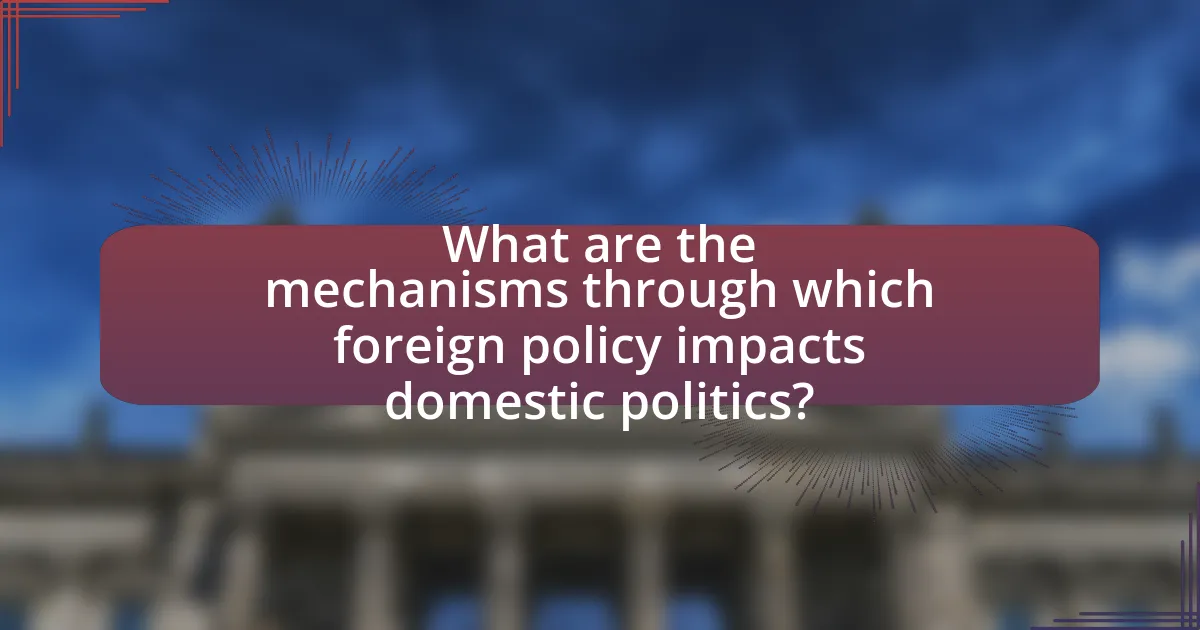
What are the mechanisms through which foreign policy impacts domestic politics?
Foreign policy impacts domestic politics through mechanisms such as public opinion shaping, political party dynamics, and legislative agendas. Public opinion can be influenced by foreign policy decisions, as citizens often react to international events, which can lead to shifts in support for government actions or political leaders. For instance, the approval ratings of U.S. presidents often fluctuate in response to foreign crises, as seen during the Gulf War in the early 1990s, when President George H.W. Bush’s approval ratings soared due to successful military intervention.
Political party dynamics are also affected, as parties may align their platforms based on foreign policy stances to attract voters. For example, the Democratic Party’s stance on international trade has evolved in response to changing public sentiment regarding globalization. Additionally, foreign policy can drive legislative agendas, as seen when Congress prioritizes national security funding or foreign aid in response to international threats or humanitarian crises, such as the post-9/11 focus on counterterrorism legislation.
These mechanisms illustrate the interconnectedness of foreign policy and domestic political landscapes, demonstrating how international actions can reverberate through national governance and public sentiment.
How do international relations influence national elections?
International relations significantly influence national elections by shaping public opinion, party platforms, and candidate strategies. For instance, events such as military conflicts or diplomatic agreements can sway voter perceptions about national security and economic stability, leading to shifts in electoral support. Historical examples include the impact of the Vietnam War on U.S. elections in the 1960s and 1970s, where public discontent over foreign policy directly affected the electoral outcomes and party dynamics. Additionally, international trade agreements can influence economic conditions, which are critical factors in voter decision-making, as seen in the 2016 U.S. presidential election where trade policies were central to the candidates’ campaigns.
What examples illustrate the impact of foreign policy on electoral outcomes?
The impact of foreign policy on electoral outcomes can be illustrated by the 2004 U.S. presidential election, where the Iraq War significantly influenced voter sentiment. George W. Bush’s administration faced scrutiny over the war, which led to a polarized electorate; however, his strong stance on national security ultimately helped him secure re-election against John Kerry. Additionally, the 2016 U.S. election showcased how foreign policy issues, particularly regarding Russia and cybersecurity, shaped public perception and voting behavior, with Donald Trump’s approach appealing to voters concerned about national security and foreign relations. These examples demonstrate that foreign policy decisions can directly affect electoral results by shaping voter priorities and perceptions of candidates.
How do candidates leverage foreign policy in their campaigns?
Candidates leverage foreign policy in their campaigns by highlighting their expertise and proposed strategies to address international issues, which can resonate with voters concerned about national security and global standing. For instance, candidates often reference past foreign policy successes or failures to frame their positions, such as emphasizing diplomatic achievements or criticizing military interventions. This approach is supported by research indicating that voters prioritize candidates’ foreign policy credentials, especially during times of international crisis, as seen in the 2008 presidential election when Barack Obama’s stance on foreign policy helped him gain support amid the Iraq War.
What are the economic implications of foreign policy on domestic political landscapes?
Foreign policy significantly impacts domestic political landscapes through economic channels such as trade agreements, sanctions, and foreign aid. For instance, trade agreements can stimulate economic growth by opening new markets for domestic producers, which can bolster political support for the government. Conversely, sanctions can lead to economic downturns, resulting in public discontent and political instability. Historical examples include the North American Free Trade Agreement (NAFTA), which increased trade between the U.S., Canada, and Mexico, influencing domestic political debates on economic policy. Additionally, foreign aid can enhance a government’s legitimacy and support, as seen in U.S. aid to Israel, which has implications for domestic political alignments. Thus, the economic implications of foreign policy are crucial in shaping domestic political dynamics.
How do trade agreements affect domestic political stability?
Trade agreements can significantly impact domestic political stability by influencing economic conditions, which in turn affect public sentiment and government legitimacy. For instance, trade agreements often lead to job creation or loss, altering the economic landscape and potentially causing social unrest or support for the government. A study by the National Bureau of Economic Research found that trade liberalization can lead to increased economic growth, which generally enhances political stability. Conversely, if trade agreements result in job losses in key sectors, they can lead to public discontent and political polarization, as seen in the backlash against NAFTA in the United States during the 1990s. Thus, the effects of trade agreements on domestic political stability are complex and contingent on their economic outcomes.
What is the relationship between foreign aid and domestic political support?
Foreign aid often enhances domestic political support by providing resources that can be used to address local issues and improve public welfare. When governments receive foreign aid, they can allocate funds to social programs, infrastructure, and economic development, which can increase their popularity among citizens. For instance, a study by the Center for Global Development found that countries receiving substantial foreign aid tend to experience higher levels of public approval for their governments, as citizens perceive tangible benefits from the aid. Additionally, foreign aid can strengthen political stability by fostering economic growth and reducing poverty, which in turn can lead to greater political support for the ruling parties.
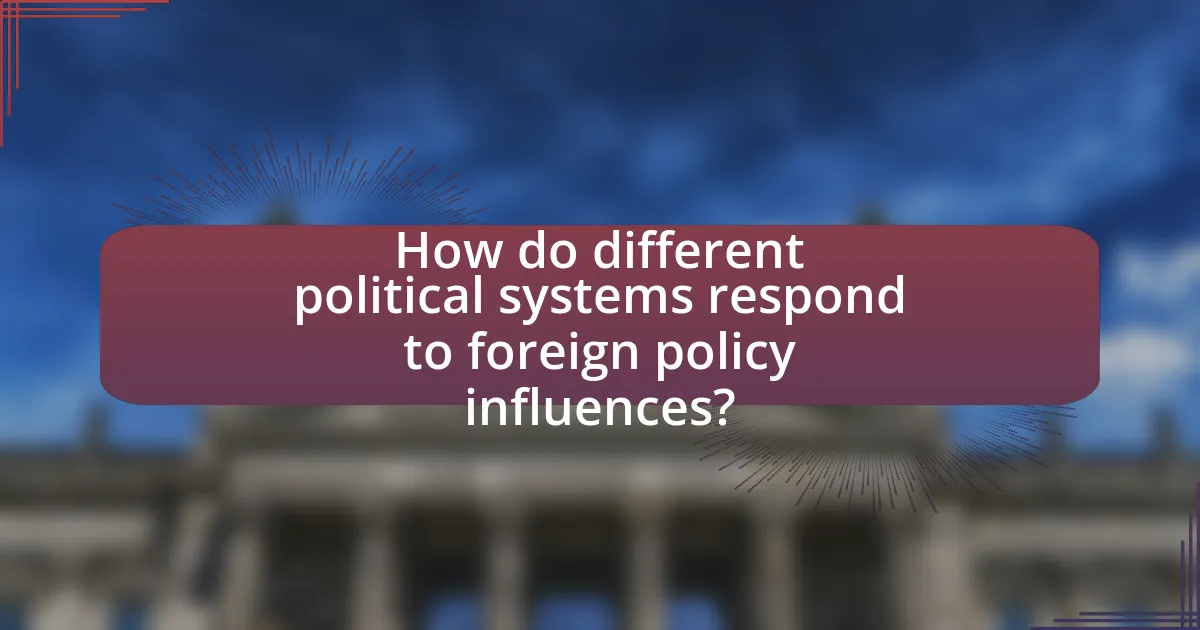
How do different political systems respond to foreign policy influences?
Different political systems respond to foreign policy influences in distinct ways, shaped by their governance structures and ideological frameworks. Democratic systems often prioritize public opinion and legislative approval, leading to foreign policies that reflect the electorate’s preferences, as seen in the United States where Congress plays a significant role in ratifying treaties. In contrast, authoritarian regimes may implement foreign policies unilaterally, focusing on regime stability and control, exemplified by China’s centralized decision-making process that prioritizes national sovereignty and economic interests. Additionally, hybrid systems may exhibit a mix of these approaches, balancing between public sentiment and elite decision-making, as observed in countries like Turkey, where foreign policy is influenced by both popular nationalism and the ruling party’s agenda.
What are the differences in response between democratic and authoritarian regimes?
Democratic regimes typically respond to foreign policy challenges through public debate, legislative processes, and accountability mechanisms, while authoritarian regimes often rely on centralized decision-making and suppression of dissent. In democracies, leaders are held accountable by voters and must consider public opinion, as seen in the U.S. response to the Iraq War, where widespread protests influenced policy decisions. Conversely, authoritarian regimes, such as North Korea, prioritize regime stability and control over public discourse, often using propaganda to justify their actions without public input. This fundamental difference in governance structures leads to varied responses to international events, with democracies emphasizing transparency and participation, while authoritarian regimes focus on control and secrecy.
How does foreign policy dissent manifest in democratic societies?
Foreign policy dissent in democratic societies manifests through public protests, political debates, and media criticism. Citizens often express their disagreement with government actions by organizing demonstrations, as seen in the widespread anti-war protests during the Vietnam War era, which significantly influenced public opinion and policy. Additionally, dissent is articulated in legislative bodies where opposition parties challenge the ruling government’s foreign policy decisions, exemplified by congressional debates over military interventions. Media outlets also play a crucial role by scrutinizing and critiquing foreign policy, shaping public discourse and opinion. This multifaceted expression of dissent reflects the democratic principle of free speech and the active engagement of citizens in shaping their government’s actions on the global stage.
What strategies do authoritarian regimes use to manage foreign policy criticism?
Authoritarian regimes employ several strategies to manage foreign policy criticism, including propaganda, repression, and diplomatic maneuvering. Propaganda is used to shape public perception by portraying foreign critics as hostile or biased, thereby rallying domestic support. Repression involves silencing dissent through censorship, intimidation, or imprisonment of critics, which discourages public opposition to foreign policy decisions. Diplomatic maneuvering includes forming alliances or engaging in negotiations to counteract criticism, often leveraging economic or military support to bolster their position. These strategies are evident in cases like Russia’s response to Western sanctions, where state-controlled media framed the sanctions as unjust aggression, reinforcing nationalistic sentiments among the populace.
How do social movements interact with foreign policy in shaping domestic politics?
Social movements interact with foreign policy by mobilizing public opinion and influencing political agendas, which in turn shapes domestic politics. For instance, movements advocating for human rights can pressure governments to adopt foreign policies that align with their goals, such as sanctions against oppressive regimes. This interaction is evident in the anti-apartheid movement, which galvanized international support and led to changes in U.S. foreign policy, ultimately impacting domestic political discourse around civil rights and social justice. Additionally, social movements can leverage foreign policy decisions to highlight domestic issues, creating a feedback loop that reinforces their objectives and alters political landscapes.
What role do grassroots organizations play in influencing foreign policy?
Grassroots organizations play a significant role in influencing foreign policy by mobilizing public opinion and advocating for specific issues. These organizations often engage in campaigns that raise awareness about international matters, thereby shaping the narrative and priorities of policymakers. For instance, during the Vietnam War, grassroots movements like the anti-war protests significantly impacted U.S. foreign policy by demonstrating widespread public dissent, which ultimately contributed to the decision to withdraw troops. Additionally, grassroots organizations utilize social media and community outreach to amplify their messages, making it easier to influence legislative agendas and hold elected officials accountable for their foreign policy decisions.
How can social movements affect government responses to international issues?
Social movements can significantly influence government responses to international issues by mobilizing public opinion and pressuring policymakers. For instance, the anti-Vietnam War movement in the 1960s and 1970s led to widespread protests that ultimately swayed U.S. government policy, resulting in a withdrawal from Vietnam. Additionally, movements advocating for climate action, such as Fridays for Future, have prompted governments to adopt more aggressive environmental policies in response to public demand for action on global warming. These examples illustrate how organized collective action can shape governmental priorities and responses to pressing international challenges.
What best practices can be adopted to navigate the influence of foreign policy on domestic politics?
To navigate the influence of foreign policy on domestic politics, policymakers should prioritize transparency, engage in public discourse, and foster bipartisan cooperation. Transparency in foreign policy decisions helps build public trust and mitigates misinformation, as seen in the U.S. government’s efforts to communicate the rationale behind military interventions. Engaging in public discourse allows for diverse viewpoints to be considered, which can lead to more informed decision-making, exemplified by the debates surrounding trade agreements that impact domestic industries. Bipartisan cooperation is essential for creating stable foreign policy that aligns with national interests, as demonstrated by the passage of the Marshall Plan, which received support across party lines and significantly influenced both foreign relations and domestic economic recovery.
